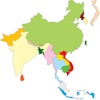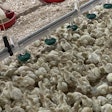
Tyson Foods reported a lackluster performance for the second quarter of fiscal year 2023, particularly concerning its chicken segment, but Tyson CEO Donnie King is optimistic the business will turn around.
Tyson Foods on May 8 reported that during the second quarter, which ended on April 1, it experienced a $91 million net loss. Meanwhile, it reported an adjusted operating loss of $166 million for its chicken segment during the quarter.
“Last quarter we said that we expected Q2 to be tougher than Q1, and this quarter was definitely a tough one,” King said during a call with analysts that followed the release of the results, which King added were “weaker than expected.”
King said there are three particular macroeconomic reasons the chicken segment did not perform as well as the company would have liked.
1. Marketing conditions
King said marketing conditions are presently “very challenging.”
“Commodity prices for most fresh chicken cuts are much lower than last year, with boneless breast meat, tenders and wings down more than 50%. While we’re not fully exposed to commodity markets, we are not immune to their dynamics,” King said.
While some people might think that those market dynamics will have an immediate impact on financial results, King said they actually work on a lag time. As chicken commodity prices dropped in the first quarter, the impact continued through the second quarter. Price increases seen during the second quarter are expected to impact the third quarter, King noted.
2. Input costs
When compared to the second quarter of 2022, input costs were higher during the most recent quarter. The largest input, feed, cost the company an estimated $145 million more than it did during the same quarter of the previous year.
3. Avian influenza
King said that the impact of the highly pathogenic avian influenza (HPAI) outbreak has not directly had much of an impact on Tyson’s live operations, the outbreak has still had a negative impact as it has restricted the company’s access to multiple key export markets.
Optimism remains
Despite a dismal quarter, King stressed the company’s commitment to turning the business around.
“I want to underscore that we are focused on improving our results in chicken. We can do that by implementing our strategy leading to continued growth and improved margins, and I’m confident that we have the right leadership team in place to get us there,” King said.
A separate article where King outlined the key components of that growth and improvement strategy appears on WATTPoultry.com.



















